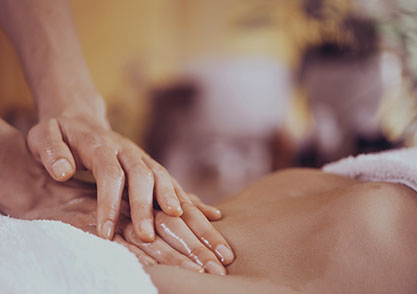Udvartana: Dry Powder Massage
Udvartana is a treatment in Ayurveda that uses herbal pastes or dry herbal powders during the body massage. Of particular...
Ayurvedic Wellness Clinic & Spa In The Heart Of Orchard, Singapore
Holiday Inn Orchard City Centre 11 Cavenagh Road
B1-01 Singapore 229616

The Abhyanga is a body massage done with warm oil. Massage has been used for centuries for both therapeutic and prevention purposes.
The oil is applied to the entire body, from the scalp to the soles of your feet. This special massage , which uses medicated oils to target specific diseases, usually lasts about 45-60 minutes.
Abhyanga is a Sanskrit (Indian language) word derived from “abhi” and “anga”. Abhi means “towards” and anga means “body part”. In a literal sense, Abhyanga would mean “on body”.
Abhyanga is a form of Ayurvedic therapy that involves massage of the entire body from the head to the toe with Dosha-specific warm herb-infused oil.
In Ayurvedic texts, Abhyanga is mentioned as part of the daily routine (dinacharya). It is also an essential preparatory step of Panchakarma treatment.
Ayurveda classics have mentioned various types of Abhyanga. This classification is done based on the body part being massaged:-
Depending on the specific disease, medicated oils are determined by the Ayurvedic physician. Generally, sesame oil is used for the body and coconut oil for the head irrespective of doshas.
Clothes other than undergarments of the person whose Abhyanga is to be done are removed so that massage can be done on body parts.
The person is seated on the Droni massage table.
The therapists then warm the oil to a soothing temperature. Oil is applied to the head first and then the whole scalp.
Then oil massage of the ear, palm and feet is done. After this, the person is made to lie down on his back. The heated oil is applied uniformly to the body by the therapist.
Afterward massage of the head is done and subsequently moves down to the neck, upper back, shoulders, upper arms, forearms, hands, chest, abdomen, lower back and lower limbs.
The proper procedure of Abhyanga is that it is performed in seven (7) sequential postures. These are: sitting, supine (lying on the back), left lateral, prone (lying on the stomach), right lateral, supine (lying on the back) and sitting.
Overall upward and downward strokes are done by therapists while doing Abhyanga on hands and legs. Circular strokes are used for massaging joints, chest and abdomen.
The whole Abhyanga procedure normally takes 45 minutes.
Skin is the body’s largest organ, so applying oil on the skin can help bring the vata into balance. By ensuring the body is well-lubricated, it can combat concerns such as roughness and dryness. All this can delay the effects of ageing, and remove fatigue, firm the skin and improve sleep. Here, other ways it works:
In Ayurvedic texts, limited description is mentioned on how Abhyanga works for the body. The application of touch and pressure in various manners constitutes the maneuvers of massage.
The modern view is that internal fluids of the skin are subjected to movement in the massage because of osmotic pressure. Massage causes mechanical hydrostatic pressure in the extracellular compartment. Massage helps fluid enter the viscera, tissues and dilute the accumulated toxins. The diluted toxins are brought into general circulation and during the course; they are expelled out via elimination procedures.
General benefits of Abhyanga are:
Udvartana is a treatment in Ayurveda that uses herbal pastes or dry herbal powders during the body massage. Of particular...
Podikizhi is made up of two words, Podi and Kizhi. The word “kizhi” in Indian Malayalam language means poultice or...
Virechana is a Sanskrit word that means evacuation of waste through the bowels. Virechana is one of the five sacred...